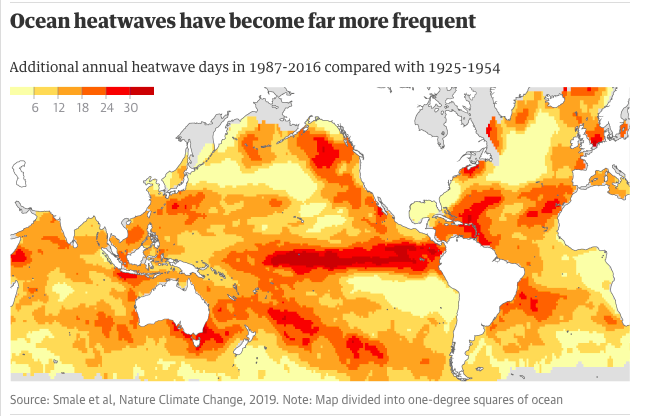
Graphic: The Guardian
Two new studies shed greater light on the impacts that climate change is having on oceans and fisheries. A study published last weekend in the Journal Science found that climate change has caused a 4.1 percent decline between 1930 and 2010 in the global productivity of ocean fisheries, with some of the largest fish-producing regions of the globe experiencing much greater losses of up to 35 percent.
- Specifically, the researchers determined that the most negatively impacted areas are five regions that include the Sea of Japan/East China Sea and the North Sea, where fisheries experienced losses between 15% and 35%.
- The losses are even greater when overfishing is factored in — it is significantly harder for fisheries to rebuild populations with ocean warming.
- Some fish species benefited from temperature changes, such as fisheries in Labrador-Newfoundland, the Baltic Sea, and the Indian Ocean.
- However, these gains are far outnumbered by the declining populations – and even the fisheries that gained may eventually experience declines as temperatures continue to rise.
And in more bad news for the oceans, a new study published in Nature Climate Change reported that the number of ocean heat wave days each year increased by more than 50 percent between 1987 and 2016 as compared to the years between 1925 and 1954, with these heat events occurring more frequently and lasting for longer periods of time. The lead author of the study said, “You have heatwave-induced wildfires that take out huge areas of forest, but this is happening underwater as well. You see the kelp and seagrasses dying in front of you. Within weeks or months they are just gone, along hundreds of kilometres of coastline.”
Why This Matters: Oceans are vital to human life. And the damage to oceans that these studies indicate is very alarming news, with implications for food security, sea level rise, and storm protection. This week leaders from around the globe are meeting at the World Ocean Summit organized by The Economist, an annual event that is intended to heighten awareness, particularly among leaders in business, about the importance of conserving our oceans. These problems certainly need their attention. And these studies should, of course, provide further impetus for countries like the U.S. to do more to curb greenhouse gas emissions.
To Go Deeper: I (Monica) wrote an op/ed with Johan Bergenas of Vulcan, Inc. on Five Pernicious Myths About Seafood that appeared in yesterday’s edition of The National in Abu Dhabi, where the World Ocean Summit is being held.
To Go Even Deeper Into Saving the Ocean: This podcast from The National with National Geographic Explorer-in-Residence Enric Sala is worthy of your time.

Dr. Enric Sala, National Geographic Society
March 6, 2019 » Abu Dhabi, climate change, Enric Sala, fisheries, heat waves, National Geographic Society, ocean warming, oceans, The Economist, The National, Vulcan, World Ocean Summit


